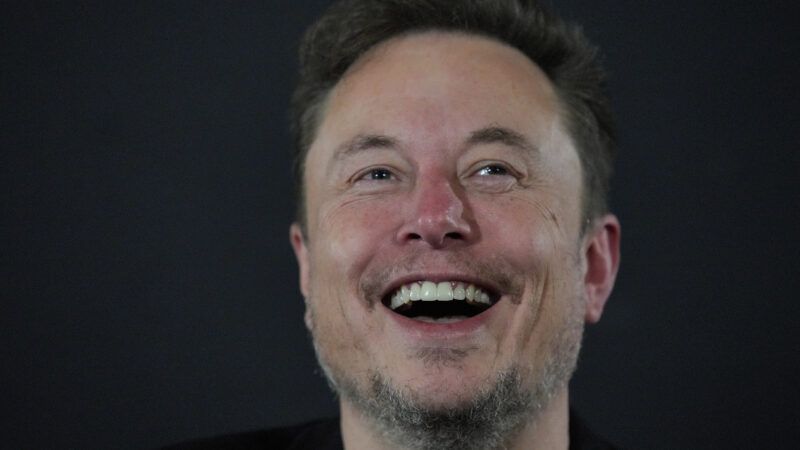Will Elon Musk's Twitter Sex Jokes End the Administrative State?
SpaceX argues the federal agency trying to punish it for firing employees critical of Musk is itself unconstitutional.

Could Elon Musk's Twitter jokes about sexual harassment kickstart a chain of events that ends with large swaths of the administrative state being struck down by the courts? We're further along this timeline than you might think.
Earlier this month, SpaceX—where Musk is co-founder and CEO—filed a lawsuit in federal court against the National Labor Relations Board (NLRB) and its members arguing that the independent agency's insulation from presidential authority and its system for deciding labor disputes is unconstitutional.
The company's lawsuit came one day after the NLRB filed its own complaint against SpaceX for firing several employees who'd circulated an open letter demanding the company condemn Musk's "harmful Twitter behavior."
The harmful behavior mainly involved Musk joking about SpaceX's settlement of a sexual harassment claim against him brought by a former company employee, per reporting from The New York Times.
SpaceX claimed the employees' anti-Musk activism was disruptive and merited termination.
After being fired, the employees filed NLRB complaints, arguing SpaceX violated their rights under federal labor regulations. That eventually led to the board filing a complaint against SpaceX this January.
Like many independent federal agencies, the NLRB complaint against SpaceX will be heard by an administrative law judge who works for the agency. If SpaceX doesn't like the judge's decision, it has to appeal to NLRB members themselves.
Neither NLRB members nor its administrative law judges can be removed by the president at will. They can only be fired for cause. The agency also uses its adjudication process to set substantive policies that bind private parties.
"In effect, the NLRB is acting as the lawmaker, the prosecutor, the jury, the judge, and the appellate court before a company has a chance to get to a real court," says Oliver Dunford, an attorney at the Pacific Legal Foundation (PLF).
SpaceX's lawsuit argues that this whole setup is unconstitutional. The inability of the president to fire NLRB members and judges violates his constitutional powers to hire and fire "officers of the United States." Its adjudication process violates the Seventh Amendment's guarantee of jury trials. The fact that the NLRB prosecutes violations of policies it sets in front of its administrative law judges and hears appeals of those judges' decisions all violates due process guarantees.
SpaceX's arguments against the NLRB have implications for many other federal agencies that are structured the same way.
"To say this structure itself violates the Constitution would be saying a large swath of the federal government is unconstitutional," one attorney told Bloomberg Law.
The U.S. Supreme Court is currently considering a case that challenges the Security and Exchange Commission's structure and adjudication process on similar grounds. PLF is suing the Consumer Product Safety Commission and the Environmental Protection Agency over related issues.
Claims that SpaceX's arguments would end the administrative state are overblown, says Dunford. Most federal administrative law judges are within the Social Security Administration dealing with questions about government benefits, he says.
That's much different than independent agencies that regulate private rights. It's when government bodies are telling private parties what to do, and punishing them for non-compliance, that due process and jury trial rights are relevant, argues Dunford.
Rent Free is a weekly newsletter from Christian Britschgi on urbanism and the fight for less regulation, more housing, more property rights, and more freedom in America's cities.


Show Comments (46)